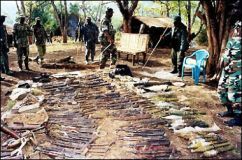Sudan will work closely with Uganda to combat rebels
KHARTOUM, Sudan, July 12, 2005 (AP) — Sudan said Tuesday it would fully cooperate with Uganda to combat the rebel Lord’s Resistance Army, which has led several recent attacks on civilians in northern Uganda and southern Sudan.

|
|
Ugandan army soldiers display weapons captured from the Lords Resistance Army (LRA) in Kipwayi hills, some 50 miles inside Sudan near the border with Uganda on April 7, 2005. (AFP). |
“The Sudanese government is fully committed to work with the Ugandan government for the eradication of the remnants of the Lord’s Resistance Army troops in southern Sudan,” Foreign Minister Mustafa Osman Ismail was quoted as saying by the official Sudan News Agency.
Last week the Ugandan rebels attacked the area of Rajaf, a couple of kilometers outside the southern Sudanese city of Juba, killing and wounding four people and driving hundreds to seek refuge in the city. In Uganda, rebels killed at least 10 civilians in on Sunday.
“This group has become a threat not only to northern Uganda alone but it is now undermining security and peace in southern Sudan, obstructing troops’ movement and the civilians convoys,” Ismail said. “This is why our efforts will be pooled toward eliminating this group, for the security of southern Sudan and northern Uganda.”
The Ugandan army spokesman said Monday that soldiers had killed the LRA chief of staff and the eldest son of the leader of the group in a battle last month.
Sudan once backed the LRA in its insurgency against the Ugandan government, which was supporting the Sudan People’s Liberation Army in its battle against the Islamic government in return. Sudan and Uganda normalized relations in 2001, and Ugandan troops have been allowed to operate in some parts of southern Sudan.
The LRA still maintains bases in remote southern Sudan from which it wages its battles but its presence there faces a setback with the end of Sudan’s civil war in January and the Saturday inauguration of former rebel leader John Garang, who has said that he would work for peace in northern Uganda.
Ismail, the foreign minister, promised that Sudan, having now realized peace at home, would cooperate with its neighbors in resolving their problems and other African issues.
Sudan on Saturday began implementation of its January peace agreement with Garang’s inauguration as first vice president and the adoption of a new constitution. Ugandan President Yoweri Museveni was one of a number of heads of state who attended the ceremony. He met with senior Sudanese officials in Khartoum.
